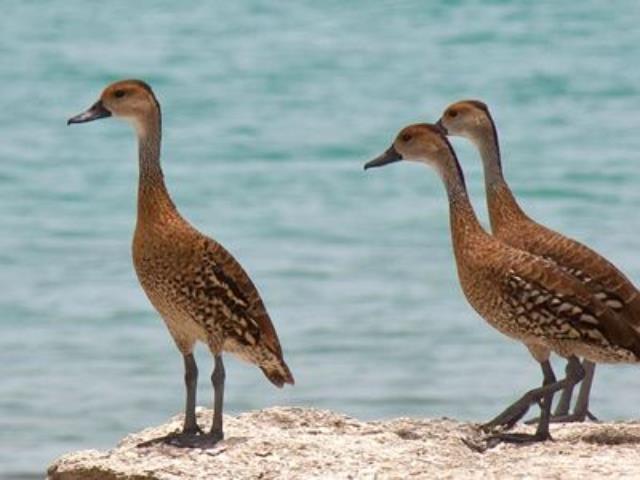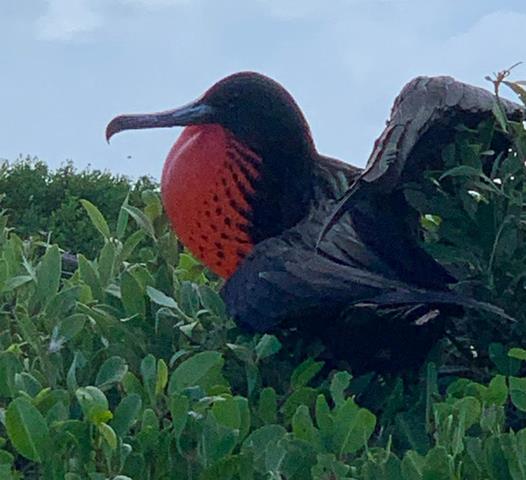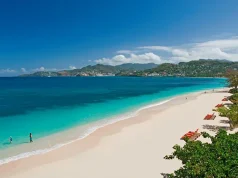
| The beautiful island of Antigua is a natural bird watcher’s paradise. This beloved vacation destination is also home to over 120 species of birds, many of which are endemic to the Caribbean region. Antigua’s sister island Barbuda is home to the largest frigatebird colony in the western hemisphere, making it a must-see destination for bird watchers! Many captivating bird species can also be spotted at different scenic spots around the island, making every hike an opportunity to see something new. Whether you’re a seasoned avian enthusiast or just getting the hang of your binoculars, read on to find out more about some of Antigua & Barbuda’s most unique birds – some of which have no known habitat anywhere else in the world! |

| Frigatebirds —also known as a “Man-O-War”— are large, graceful birds that can commonly be seen soaring both on and offshore in Antigua and Barbuda. With an incredibly unique visual profile, these birds leave an indelible impression. The male is glossy black and will blow up his scarlet throat to attract females. In comparison, the females are larger with their sides and breasts white. In the Caribbean, they are known as “Weather Birds,” as they will circulate inland when a storm appears to be nearing. Fishermen appreciate frigatebirds as they dive down and help locate schools of fish. They even have a mischievous side: they are also known to rob other sea birds of their freshly caught fish! Take a short boat trip to Antigua’s sister island Barbuda it boasts the largest frigatebird colony in the western hemisphere! Barbuda’s Codrington Lagoon has a protected Frigatebird Sanctuary with an estimated population of 100,000 birds. While coasting on the clear blue water, these magnificent birds can be seen in their natural habitat. Their spirited mating display is not to be missed, and the birds are remarkably photogenic and camera-friendly: they’re always ready for their close-up! |
| Antigua has an indented coastline with numerous islands, creeks, inlets, and wetlands. This diversity of habitable land and the constant proximity to water makes the island a perfect habitat for shorebirds and waterbirds. McKinnon’s Salt Pond, North of St. John’s, is a top-notch spot on the island for spotting waterbirds, including the West Indian Whistling Ducks and White-cheeked Pintails. It’s also not uncommon to spy Least Terns, Wilson’s Plover and other shorebirds in McKinnon’s Salt Pond, who are known to use it as a pitstop during their migratory routes When spending time on the beach, keep your eyes out for the Brown Pelican. These daring divers can often be seen skimming the water in search of tasty fish to scoop up with their large, net-like bills. It’s never a bad idea to have your eyes on the sky when exploring Antigua & Barbuda: the Brown Pelican is known to fly inland as well, and may plunge into lagoons or ponds from as much as 70 feet up! |

Antigua has tropical forests dispersed throughout the island, providing desirable habitats for traditional tree-dwelling birds. In particular, Antigua’s verdant Wallings Reserve can claim an incredible amount of biodiversity: its evergreen deciduous forests are home to Ruddy Quail-Doves, Scaly-naped Pigeons, and Broad-winged Hawks. Just as human hikers flock to Wallings to avail themselves of its many trails, the reserve draws migratory species from other islands in the Caribbean, including the Barbuda Warbler.
As anyone who has ever enjoyed a tropical cocktail can attest to, few destinations do fruit quite like the Caribbean. The various tropical fruits that grow in the forests of Antigua (such as mango, avocado, and guava) draw countless hungry birds to its leafy canopies, including Antillean Crested Hummingbirds, Green-throated Caribs and Bananaquit birds.
Antigua is full of vast salt ponds, mangroves and woodlands creating homes for diverse tropical bird life. While visiting Antigua and Barbuda you should consider adding a spot of birdwatching to your itinerary. While much has been said of the island’s pristine beaches and elegant resorts, there’s plenty more beauty to appreciate if you only look up.





